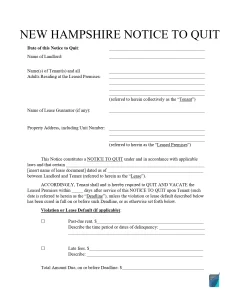New Hampshire Eviction Notice Forms
The New Hampshire eviction notice form is a legal document landlords must furnish tenants to begin the eviction procedure. This document is an official demand for the tenant to vacate the premises. State legislation mandates the eviction notice template whenever a landlord intends to regain control of their property for reasons including nonpayment of rent, breach of lease conditions, or termination.
In New Hampshire, the specifics of the notice depend on the reason for infringement. For example, landlords must give a minimum of seven days’ notice for nonpayment of rent. If the eviction is due to a lease violation, the notice period may vary based on the agreement and the nature of the breach. The document must clearly state the reason for eviction and the date the tenant must leave the property.

Build Your Document
Answer a few simple questions to make your document in minutes
Save and Print
Save progress and finish on any device, download and print anytime
Sign and Use
Your valid, lawyer-approved document is ready
New Hampshire Eviction Laws
Eviction laws are primarily governed by New Hampshire Revised Statutes, which provide comprehensive rules for landlords to legally terminate tenancies. These statutes specify different requirements for eviction notices based on the circumstances, such as nonpayment of rent or violations of lease terms.
For nonresidential tenancies, Section 540:3 mandates that landlords must provide a seven-day notice if the tenant has not paid due rent and is in arrears. If rent is collected more frequently than every three months, the required notice period should match the frequency of the rent payments. In all other cases, a three-month notice is required. The reasons for eviction can be grouped into several categories:
- Economic. Nonpayment of rent or habitual late payment.
- Behavioral. Violation of lease terms related to tenant behavior that impacts the safety and well-being of other tenants or the property.
- Contractual. Failure to adhere to other material terms of the lease agreement.
For residential tenancies, a 30-day notice is generally required, but there are exceptions where only a seven-day notice is necessary, particularly if the eviction is due to reasons specified under Section 540:2. These include severe lease violations that adversely affect the health or safety of other tenants or the landlord’s property, such as significant damage to the premises or involvement in illegal activities.
Furthermore, if a residential eviction is due to unpaid rent, the notice must inform the tenant of their right to prevent it by paying the back rent and any associated liquidated damages as outlined in Section 540:9.
New Hampshire Eviction Notice Laws Details
| Rent Grace Period | Not Mentioned |
| Notice of Non-Payment | 7 days |
| Notice of Non-Compliance | 30 days |
| State Laws | New Hampshire Revised Statutes, Chapter 540 |
Eviction Notice Types Used in New Hampshire
In New Hampshire, eviction notices are tailored to the specific reasons they are issued. Each type of notice serves a distinct purpose and must comply with the requirements set out in state law.
Nonpayment of Rent Notice
Landlords can issue a nonpayment notice to tenants who fail to pay rent on time. According to Section 540:3, residential tenants are generally given a 7-day notice to pay the due rent or face eviction proceedings. This notice must include the tenant’s right to avoid eviction by paying the overdue rent and any applicable liquidated damages.
Lease Violation Notice
A lease violation notice is required when a tenant breaches specific terms of the lease other than nonpayment of rent (such as causing significant damage to the property or engaging in illegal activities). This 30-day notice must specify the nature of the breach and provide the tenant with a reasonable timeframe to remedy the violation or vacate the premises. In cases where a tenant’s behavior affects the health or safety of other tenants or the landlord, the law allows for a 7-day notice period.
End of Tenancy Notice
Landlords issue an end-of-tenancy form to terminate a tenancy at will or at the end of a lease term. Residential tenants typically receive a 30-day notice, which clearly outlines the termination of the lease as per Section 540:3. This type of notice is used when the landlord does not seek to renew the lease or when the lease naturally concludes.

Eviction Process in New Hampshire
This process begins with issuing a proper eviction notice aligned with the conditions stated in Sections 540:2 to 540:3 and progresses through several stages until it is resolved:
- Delivery of notice. If personal delivery is impossible, the eviction notice must be delivered personally, by certified mail, or through posting on the property.
- Response time. Tenants have the duration of the notice period to either resolve the issue, such as paying overdue rent or contest the eviction.
- Court filing. If the tenant does not comply with the notice, the landlord may file an eviction case.
- Hearing. A court hearing is scheduled, where both parties can present their arguments.
- Judgment. If the court rules in favor of the landlord, it will issue a judgment and a Writ of Possession, which allows the landlord to reclaim the property.
Tenants can present their case during the judicial process, where defenses such as retaliation or discrimination may be considered. Landlords must follow the legal process meticulously to avoid claims of wrongful eviction, especially under Section 540-A:3, which protects tenants from unlawful utility shut-offs and denying access to the premises.
After a court ruling in favor of the landlord, the enforcement phase begins if the tenant still does not vacate the premises. This is typically conducted by a sheriff or other authorized official, who will enforce the eviction under the court’s order.

Use our document builder to customize any template on FormsPal to your preferences. Here is a number of some other widely-used New Hampshire forms we provide.
Other Eviction Notice Forms by State